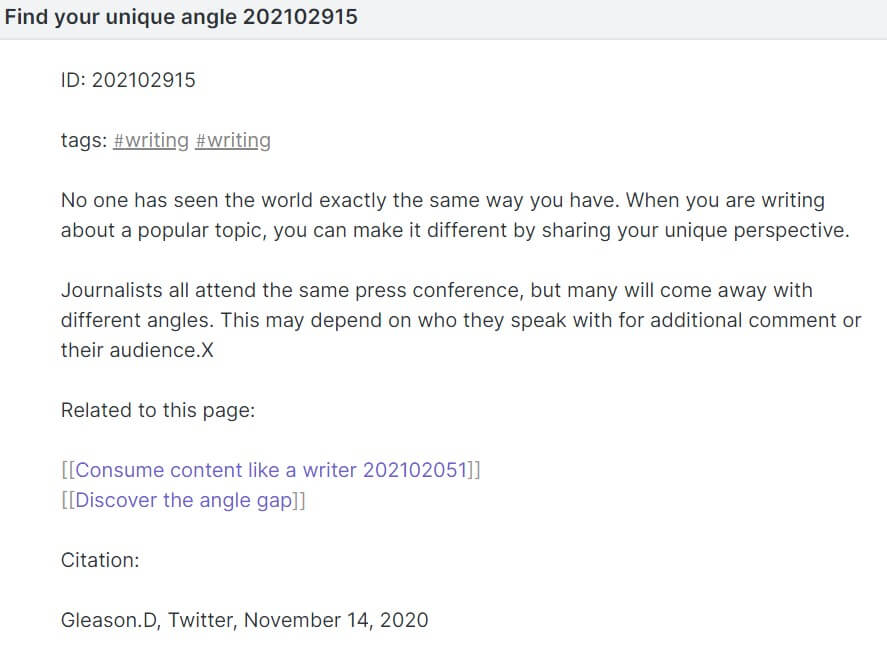Wondering how to write more?
Even if you want to write regularly, it’s not always easy to find the time.
Four years ago, I felt like I was always busy building my freelance writing career. But, at the same time, I didn’t get enough time to just write.
In this post, I will share all the tips I used to write more. Keep in mind these tips worked for me. I hope they can be useful to you, but you might need to put slight tweaks in place to make those most out of these tactics.
1. Develop a (tiny) daily writing habit
The key to writing more is to develop a daily writing habit. But if you want this habit to stick, you need to start small.
I first discovered the power of habits on author James Clear’s website. Clear doesn’t encourage us to focus on goals. Instead, he promotes habit formation. And one of the best resources on habit formation is Tiny Habits, a book by academic BJ Fogg.
In Tiny Habits, BJ Fogg writes about the three ways you can form a new habit:
- A: anchor – you need to tie your new habit to a new anchor habit
- B: tiny behavior – make your new behaviour small so it’s easy to perform
- C: celebrate your tiny behaviour
Let’s look at that in practice. I’d wake up, have a coffee, and write for 45 minutes. If only my kids didn’t sleep well, I would wake up later and only for 5 minutes. Working this way I managed to write everyday for three months, including weekends and holidays.
To implement the Tiny Habits approach in your life, think of something you do everyday. These are your anchors, and you have a ton of them: waking up, eating, brushing your teeth, and more. Then insert your writing habit after that activity.
You’ll also find that starting small makes it easier to stick to your writing habit. For example, a commitment to write for 5 minutes every day is far less overwhelming than a 1 hour writing session, at least at the start.
The best thing about a tiny habit approach is that you don’t willpower. Because you’re making a smaller time commitment, it’s easier to practice your habit.
Read more about the Tiny Habits approach here.
2. Find writing time you can defend
Think about your typical day. When do you have time all to yourself? This might be harder if you children or a full-time job. But, don’t worry– it’s still possible to protect writing time.
I once wrote every single day for almost three months.
The only reason I was able to do this is because I woke up before my kids and wrote before I started working. It was the one time during the day I knew I wouldn’t be interrupted.
Psychology professor and author Paul J. Silvia said if you want to write a lot, you must develop a writing slot and defend that time. At the moment, that’s at 5:40am in the morning for me, before my kids wake up and before I work.
Think of it as a one-hour workday before your job. That’s what academic Jeffrey J. McDonnell did. He spent an hour each morning writing before starting working on his job.
Here’s the thing: it doesn’t need to be an early morning slot. Find a time that works for you. As a parent to young children, working late into the evening isn’t an option for me. And by the time the kids get to bed, I have no mental energy left. This is why I write in the morning.
3. Block out distractions
You’ll write more if you completely tune out digital distractions.
Have you ever read a book that changed your life? For me, that book was Deep Work by Cal Newport. When I read Deep Work in 2018, I was frequently working while distracted. My phone was on my desk. I had WhatsApp Web open in another tab. I didn’t know it then but I was unable to focus.
To block out distractions, do these things:
- Take your phone out of the room
- Use a Pomodoro app to force for a short burst of time
- Try a focus music app (I use Brain.FM but you can find several playlists on YouTube.)
I also time my writing output so I can measure my deep work hours.
Here’s an exercise from Deep Work to help you train your focus:
4. Write for a reason
When you have a writing goal, you know what you’re working towards.
You have some kind of north star.
Ask yourself: why are you writing?
Back in 2018, I kept a strict writing routine for almost a year. My vision was to become an online writer but I knew I needed to improve my skills. That bigger why pulled me out of bed and kept me on track.
Understanding why you’re writing guides how you’ll spend your writing time. For example, if you want to build your personal brand in your industry, you might have the goal of writing more guest blogs.
Your writing slot might then include:
- Reading guest blogs
- Outlining potential posts
- Sending your blog pitches
5. Build an idea bank
Ever feel like you don’t know what to write more next?
Don’t let a lack of ideas hold you back.
Once you have a reliable system in place for collecting ideas, you’ll find it far easier to write.
Here’s where it helps to build a bank of ideas you can draw from.
There are several ways you can gather ideas. Right now, I have started experimenting with the Zettelkasten.
You can read more about background to the Zettelkasten here, but here’s a quick summary.
The idea is to always collect notes – either your own observations or comments from books you’re reading. You then use a tagging system to make it easier to connect your ideas.
Here’s how it looks in practice:
- Take notes while reading or as ideas come to you – even if you want to note from a book, you need to put it in your own words
- Create a note and add it to your Zettelkasten
- You’ll learn to tag the note and say which note is related to
Here’s an example note from my Zettelkasten:

Start Writing More Today
Now, you have a set of strategies you can use to write more.
Writing more is less daunting when you develop the right habits and consistently collect ideas.
Image credit: Photo by THERESE REYES from Burst
